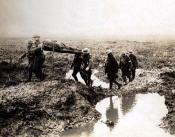Last to leave was I, those Darkling Fields of Stowborough,
As the late afternoon sun drained the happy wicket dry.
Weary boys lugged heavy kit through the gathering twilight haze,
Speculating about the evening meal; oh carefree were those days.
I lingered by the pavilion, drawn to the dying light
Swooning in the sunset, a moth without the flight.
“Hurry up boy, and don't dare slack!” cried out Old Mr Bate,
Who'd claimed he'd played for the county back in 1878.
I pointed to the boundary, mouthed a pretend word or two,
Then sauntered ever deeper towards the melancholy hue.
Beyond the treetops whispered as though in silent rhyme
The golden fields of wheat rippled in syncopated time.
I filled my lungs with twilight air, thrilling at the touch,
Wondering if the world's exquisite charm would always be gentle such.
I heard a distant rumble, a menacing growl from the east,
And saw a hungry black storm cloud preparing for a feast.
The air grew chill upon my skin and caused a twitchlike shiver,
A spot of rain fell upon my arm, like blood drawn by a quiver.
I turned with haste and sudden fear and ran back to the school,
Then stood in the doorway, gazing back, trembling like a fool.
Last to leave was I, those Darkling Fields of Stowborough,
As the relentless storm churned the unhappy wicket over.
As the late afternoon sun drained the happy wicket dry.
Weary boys lugged heavy kit through the gathering twilight haze,
Speculating about the evening meal; oh carefree were those days.
I lingered by the pavilion, drawn to the dying light
Swooning in the sunset, a moth without the flight.
“Hurry up boy, and don't dare slack!” cried out Old Mr Bate,
Who'd claimed he'd played for the county back in 1878.
I pointed to the boundary, mouthed a pretend word or two,
Then sauntered ever deeper towards the melancholy hue.
Beyond the treetops whispered as though in silent rhyme
The golden fields of wheat rippled in syncopated time.
I filled my lungs with twilight air, thrilling at the touch,
Wondering if the world's exquisite charm would always be gentle such.
I heard a distant rumble, a menacing growl from the east,
And saw a hungry black storm cloud preparing for a feast.
The air grew chill upon my skin and caused a twitchlike shiver,
A spot of rain fell upon my arm, like blood drawn by a quiver.
I turned with haste and sudden fear and ran back to the school,
Then stood in the doorway, gazing back, trembling like a fool.
Last to leave was I, those Darkling Fields of Stowborough,
As the relentless storm churned the unhappy wicket over.
Contributed by Dq82 - 2018/12/5 - 16:54
×
![]()
Note for non-Italian users: Sorry, though the interface of this website is translated into English, most commentaries and biographies are in Italian and/or in other languages like French, German, Spanish, Russian etc.









The Fall and Rise of Edgar Bourchier And the Horrors of War
La premessa è sufficiente a sgomberare il campo da ogni dubbio circa la levatura artistica di un musicista che, nonostante le notevoli prove d’autore fornite anche con la sua carriera solistica, è riuscito a rimanere, suo malgrado, sempre un po’ fuori dal circuito mainstream, in un’aura di marginalità nobile e per certi versi salvifica, che gli ha consentito di fare scelte creative talvolta ardite. Ne è la riprova questo suo ultimo, temerario lavoro, scritto a quattro mani con lo scrittore Christopher Richard Barker, per il quale ha musicato e interpretato le testimonianze immaginarie di un personaggio romanzato, il poeta di trincea Edgar Bourchier, che racconta in un variegato registro narrativo le efferatezze e le brutalità sul campo di battaglia della Prima Guerra Mondiale.
The Fall and Rise of Edgar Bourchier And the Horrors of War esce in occasione del centenario dell’Armistizio, e contiene in sé uno storytelling dall’approccio onnicomprensivo, che raccoglie frammenti multiformi di memorie immaginate, in cui entrano in gioco la paura, la giovinezza, la rabbia, la nostalgia, il senso d’inutilità. Dal punto di vista compositivo, è interessante constatare l’ambiziosa carrellata dei generi attraversati: dal folk tradizionale, che richiama un tempo perduto evocando strumenti antichi come le fisarmoniche, oltre all’inevitabile corredo di piani e chitarre acustiche (Pounding for Peace, The Poetic Clown), al post punk in pieno stile Birthday Party (Poor Por Surgeon Tim, The Expressionist #2, Corpse 564), sino alla dark wave vera e propria, con i sussurri di I Am The Messenger o The Lost Bastard Son of War, il cui riff pare emulare dichiaratamente She’s Lost Control dei Joy Division. Interessante anche l’esperimento di The Expressionist #1, dove una marcia militare e i cori che la scandiscono, sembrano voler diventare un ritmo punk.
In questo riuscito progetto atemporale, in cui sia la storia narrata che gli stili musicali richiamano il passato con un chiaro e costante riferimento al presente e una sapiente lettura contemporanea, troviamo il condensato di quello che dovrebbe essere un disco autoriale: una buona storia e un credibile incedere narrativo. Il messaggio è chiaro in tutto il suo ineluttabile pathos, eppure l’atmosfera in cui quel messaggio aleggia non appare mai enfatica e greve. Rischiava di essere un lavoro pretenzioso, è riuscito a non esserlo.
sentireascoltare.com